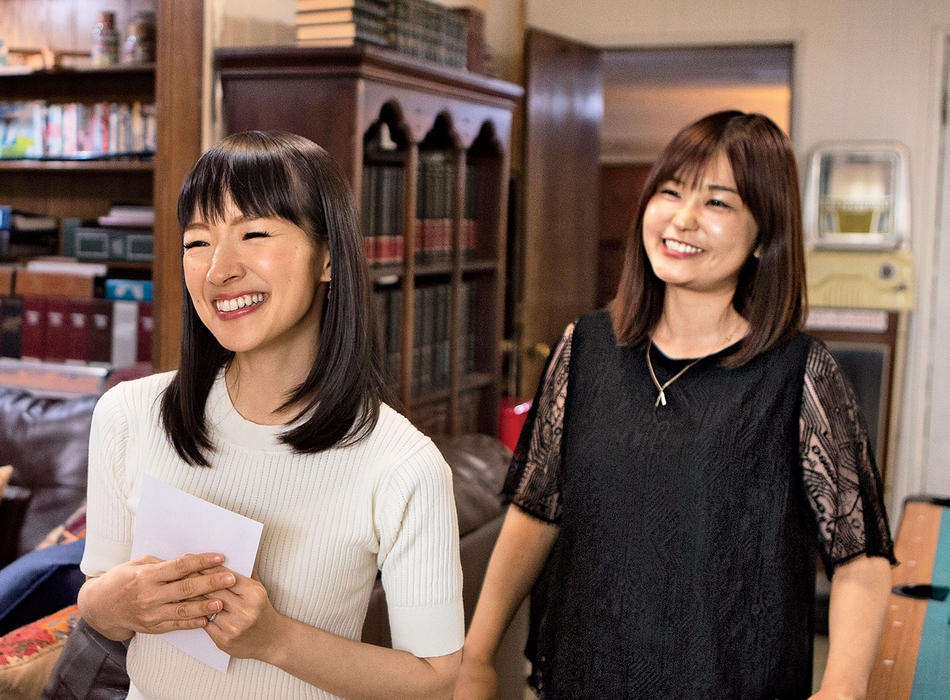Each episode of the new Netflix reality show starts the same way: a family burdened with too much stuff and not enough space explains why they’re desperate to start organizing their home. Just then, the doorbell rings! And in comes help, in the form of not one but two Maries — both petite, neatly dressed Japanese women in their mid-thirties. One is the global organizational guru Marie Kondo, author of three best-selling books and the star of Tidying Up with Marie Kondo. The other is her interpreter, Marie Iida ’11GSAS, who is quickly becoming a popular personality in her own right.
A good interpreter should almost fade into the background, and on the show, Iida is accordingly respectful and unobtrusive. But the Maries also come across as a team, working together to help Kondo’s clients bring order to their lives. Kondo, who is sprightly and ethereal, skips, hops, and flutters around each room, offering gentle encouragement and sharing her KonMari method, which asks us to let go of belongings that no longer “spark joy.” Iida is the straight man. Less a sidekick and more an anchor, she is the consummate professional — right down to the reporter’s notebook she carries in every scene. The show hinges on Kondo’s enthusiasm, warmth, and empathy, and Iida is driven to convey them flawlessly.
“Marie speaks with confidence and conviction but also brings a sense of serenity,” Iida says. “Her signature style is such an important part of the show, and I want to make sure none of it gets lost in translation.”
Iida, who has been interpreting for Kondo on a freelance basis for three years, seems remarkably comfortable on set, even though she has no prior experience on camera. She says that, unlike many reality shows, Tidying Up with Marie Kondo is entirely unscripted, which helped put her at ease. “The interactions between Marie and the families are entirely genuine,” she says. “Obviously there are a lot of moving parts — cameras and lights and tons of people — but it really is about building those relationships with the families, and it became easy to block everything else out.”
Iida says that she is moved by the way Kondo’s methods create lasting change for the families. But for her, the show is inspiring for another reason. “I’m very proud to see a fellow Japanese woman get to be at the helm of her own show,” Iida says, noting that it is rare to see a non–English speaker be given such a prominent platform. “I want to honor her courage and match her ambition.”
Iida was born in Tokyo but moved to Boston when she was in the first grade. Because of her father’s job, the family moved back and forth between Japan and the US every few years, so Iida found herself having to constantly switch between the two languages and cultures. “Straddling two cultures can be pretty isolating,” she says. “Language is such an important part of identity, and when you speak two languages, that identity can feel very fluid. I think that’s why I was eventually drawn to interpreting. It turns that gray area into a big advantage.”
Iida studied journalism and film as an undergraduate at NYU and then moved back to Japan to work at a film-production company. She quickly discovered that her English fluency opened some unexpected doors. Though Iida was hired to translate screenplays, she was asked to step in and interpret at an important meeting when the regular interpreter was out. “It was for a major Hollywood actor, so it was a bit nerve-racking,” Iida says. “But interpretation is sort of always trial by fire.”
In 2009, Iida returned to the United States to get a master’s degree at Columbia in American studies. “I’ve always been fascinated with American culture,” she says. “I wanted to study it from a literary and historical viewpoint, to think about what philosophies and voices helped shape American society as it is today.” She says her graduate work became an essential asset to her career as an interpreter.
“The best translators are equipped with a deep understanding of both cultures that they’re trying to bring together, so that they can find a worthy equivalent in the other language,” she says.
After graduating, Iida began working as a translator for publishers and universities and as an interpreter for several New York cultural institutions — including the Museum of Modern Art, the Film Society of Lincoln Center, and the Japan Society, where she first met Kondo in 2016. She moved to Los Angeles in 2017, and in addition to working with Kondo, she is finishing the translation of a novel for Soho Press.
Iida says that while she’s always been a tidy person, interpreting for Kondo has reminded her of lessons that she learned growing up in a Japanese household. “There’s a Japanese expression — shoshin ni kaeru — that means returning to basics, returning to your roots. Working with Marie has helped me to do that,” she says. “Taking care of your belongings is a fundamental part of Japanese culture, and this job has been an important reminder of that.”
Because much of her own life has been defined by the need to switch between two very different languages and cultures, Iida says she is happy to be working on a show about needs and desires that transcend those things. “As a translator, I’m always focused on what makes people different,” she says. “But the show gets down to fundamental human needs. The need to live in a space that feels comfortable and secure is universal.”



